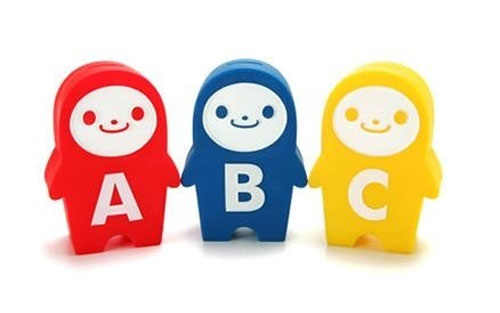了解助动词是怎样在句中起来辅助作用的,可以让你的
英语语法上升一个台阶。因为助动词是如此的通用,常见。你可能随时随地都会要使用到它。下面是
英语助动词的用法总结,大家一起来看看吧!
英语助动词的用法总结:
概要介绍:
do:用于一般时态(simple tenses)
be:用于进行时态(continuous tenses)
have:用于完成时态(perfect tenses)
一定要记好上述助动词各自的用途,它是英语语法中的黄金法则。
【be】【do】【have】作主动词:
【be】【do】【have】也可以作为主动词使用,不要与它作用助动词时混淆了。
如:
She didn't do it. 她没有做。
He is being annoying. 他真烦人。
I have had six. 我有6个。
助动词要去主语匹配:
如:
He is playing. 他在玩耍。
I am playing. 我在玩耍。
They are playing. 他们在玩耍。
助动词作用:
在肯定句中,助动词只是功能性的,没有具体的含义,因此可以缩写,发音上也可以简化。如:
I'm playing with my friends. 我正在和朋友一起玩。
He's taking his time. 他正在忙。
I've bought you some fruit. 我给你买了些水果。
在否定句中,一般与not连接缩写。
He didn't like it. 他不喜欢它。
do:
do / dose:现在时
did:过去时
do:+will / going to 用于将来时
例:
We do(一般要省略,不省略有强调的意思) eat meet on Fridays.
They don't want to go.
He doesn't eat meat.
Did you like it?
Doesn't Mike know about it?
I will do it later.
be:
am / are / is:现在进行时
was / were:过去进行时
be:用于将来时
注意:主动词用ing形式。
例:
We are following your brother.
I am trying to call him now.
It isn't raining now.
Is she bringing her friend?
Aren't we taking Mike?
He will be presenting at 6pm.
Will you be going to work today?
除了以上讲的以外,be还经常用于被动式:
I was given five minutes to finish.
have:
have / has:现在完成时
had:过去完成时
have:+will / going to 用于将来时
注意:主动词用过去分词形式。
例:
Mike has taken the car.
We have tried it many times.
He hasn't arrived yet.
Have the brought the umbrella?
We have been waiting for hours.
He will have finished by 5pm.
do用作助动词的三种用法:
一、用于构成疑问句、否定句或倒装句
1. 构成疑问句
Where do I pay? 我在哪儿付钱?
When do you start? 你何时动身?
How did you do it? 你是怎么做的?
How do you feel today? 你今天感觉如何?
Why do you keep on smiling? 你怎么老是笑?
How does the story end up? 这故事结局如何?
How does she stay so young? 她怎么能永葆青春呢?
When did you realise that the money was missing? 你什么时候发觉钱丢了?
2. 构成否定句
I don’t like football. 我不喜欢足球。
Please don’t annoy me. 请不要打搅我。
I didn’t arrive at the station early enough. 我到达车站不够早。
I don’t care how expensive it is. 我不在乎这件东西有多贵。
I didn’t meet either Jane or her husband. 简或是她的丈夫我都没遇见。
He washed the car. He didn’t polish it. 他冲洗了汽车。他没有擦拭它。
3. 构成倒装句
Never did he speak about his own merits. 他从不讲自己的功绩。
Very rarely did she receive letters from her brother. 她很少收到她兄弟的信。
Hardly had he arrived when she started complaining. 他一到家,她就抱怨起来。
Never did he think the book would be finished so soon. 他可没想到这本书会这么快看完。
Seldom has a devoted teacher been so splendidly rewarded. 一位忠诚的教师很少受到如此丰厚的报答。
二、加在动词前,表示强调
She does like dogs. 她真的喜欢狗。
Do have another cup of coffee. 请再喝杯咖啡吧。
Do be careful with that vase! 务必小心那个花瓶!
I do hope you’ll get better soon. 我真希望你早日康复。
He did come but soon went back. 他是来了,但很快就回去了。
三、用来表示刚提到的动作,以避免重复
“She likes cakes.” “She really does.”“她喜欢吃蛋糕。”“她的确喜欢。”
Watch that man—I want to know everything he does. 盯住那个人——我要了解他的一切活动。
I always eat peas with honey. My wife never does. 我总是就着蜂蜜吃豌豆。我的妻子从来不这样吃。
She paid them a generous wage for the little they did. 她为他们的那么一点工作付了很高的工资。
Some parents did it only once a week, some said they never did. 一些父母每周仅做一次,一些父母则说他们从来不做。
be的一种特殊用法:
在新课标人教版选修六第5单元中,有这样一个句子:I’ll never forget my first sight of an eruption. It was in the second week after I arrived in Hawaii. 第2句中的 was 是系动词无疑,但没有“是”的意思。那么,在这里是什么含义呢?回答这个问题,首先要搞清楚主语It指代什么。显然 It 指代上文的 eruption。既如此,was 应该是“发生”的意思,相当于 happened 或 broke out。
这就是动词be 的一个特殊用法,其主语往往是表示“事件”的名词,如:meeting, talk, lecture, report, discussion, match, game, party, concert, play, accident, eruption, event等。因此,上句译成汉语应该是:我永远忘不了我第一次看见火山喷发时的情景,那(指“火山爆发”)是发生在我抵达夏威夷的第二个星期之后。又如:
---When was her birthday party? ---It was the night before last. 她的生日派对(聚会)是何时举办的?前天晚上。(was 等于 was held)
Our school sports meet will be next week. 我们学校的运动会将在下周举行。(be等于take place)
It was reported that the accident was on Tuesday and five people were killed. 据报道事故发生在星期二,有五人丧生。(was等于happened)
This is when small amounts of gases in the atmosphere, like carbon dioxide, methane and water vapor, trap heat from the sun and therefore warm the earth. (选修6第四单元,Reading) 这种现象(温室效应)发生在大气层中少量的气体,如二氧化碳,甲烷,水蒸气等,吸收太阳的热量,因而使地球变暖的时候。(is等于takes place)
下列两句很有意思,一字之差,但意思相差甚远。请比较:
It was Sunday. We went out for a picnic.
It was on Sunday. We stayed at home and didn’t know anything about the accident.
有人把 It was Sunday. 和 It was on Sunday. 混为一谈,认为意思没什么区别。其实,这两个句子的含义大不一样。前者译为“时间是星期天”,It 指时间;后者译为“事情发生在星期天”,It 指某个事件。
一般说来,be 表示“发生”意义时,除了它的主语表示“事件”概念外,还往往有一时间状语跟它连用。
have的用法要点:
1. 表示状态(如表示拥有、患病等)或表示“必须”(即用于 have to)时,在用法上应注意以下几点:
(1) 不用于进行时态或被动语态。如:
误:We are having a piano. / A bad cold is had by him.
(2) 在否定句或疑问句中,可以不用助动词do(在非正式文体中可在have之后加got)(主要见于英国英语中),也可用助动词do(主要见于美国英语中)。如:
He hasn’t (got) a computer.=He doesn’t have a computer. 他没有
电脑。
在非正式的美国英语中,有时也用 have got 的形式,且有时还可将 have 省去。如:
I (‘ve) got a problem. 我有个问题。
(3) 即使在英国英语中,若指经常性的现象,也通常用助动词 do 来构成疑问式和否定式。且不与got搭配;若指暂时现象,则不用助动词do来构成疑问式和否定式,且可以与got连用(注:在美国英语中则无此区别,一般都用do构成疑问式和否定式)。如:
Have you (got) a cold now? 你感冒了吗?
Do you often have colds? 你感冒了吗?
I haven’t got to work tomorrow. 我明天不必上班。
I don’t usually have to work on Sundays. 星期天我通常不必上班。
(4) 表示“拥有”时,构成否定式有两种可能:若其后的名词没有限定词修饰,则通常用 have no;若有限定词(如a, any, much, many, enough等)修饰。则通常用 have not。如:
I have no friends. / I haven’t any friends. 我没有朋友。
He hasn’t much money. 他没有很多钱。
2. 表示动作,如表示“吃(=eat)”“喝(=drink)”“拿(=take)”“收到(=receive)”“度过(=spend)”等时,在用法应注意以下几点:
(1) 可用于进行时态,但一般不用于被动语态。如:
误:Lunch is had by him.
正:He is having lunch. 他在吃中饭。
(2) 不与 got 连用。如:
误:I’d like to have got a look at it.
正:I’d like to have a look at it. 我想看看它。
(3) 一般不用缩略式。如:
误:We’d a good time at the party.
正:We had a good time at the party. 我们在晚会上玩得很高兴。
(4) 构成否定式和疑问式时,必须用助动词 do。如:
误:When had you breakfast?
正:When did you have breakfast? 你什么时候吃早餐?
